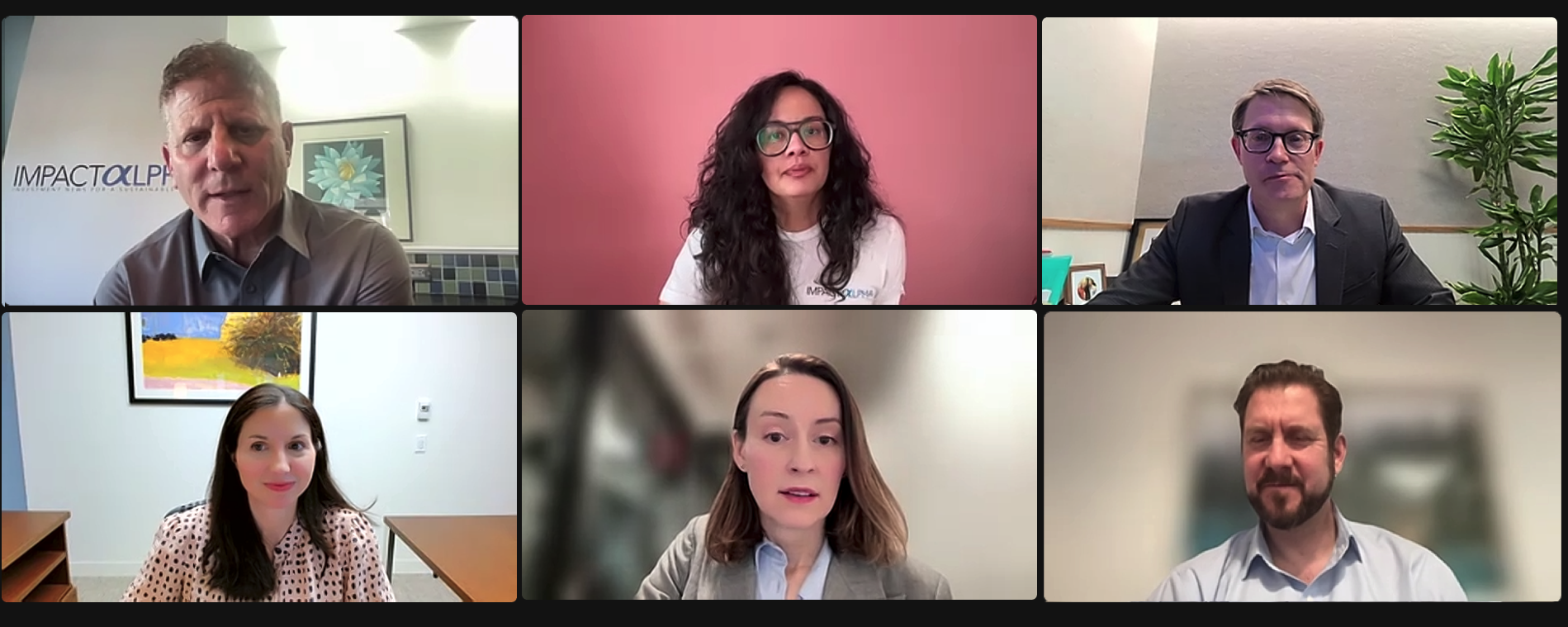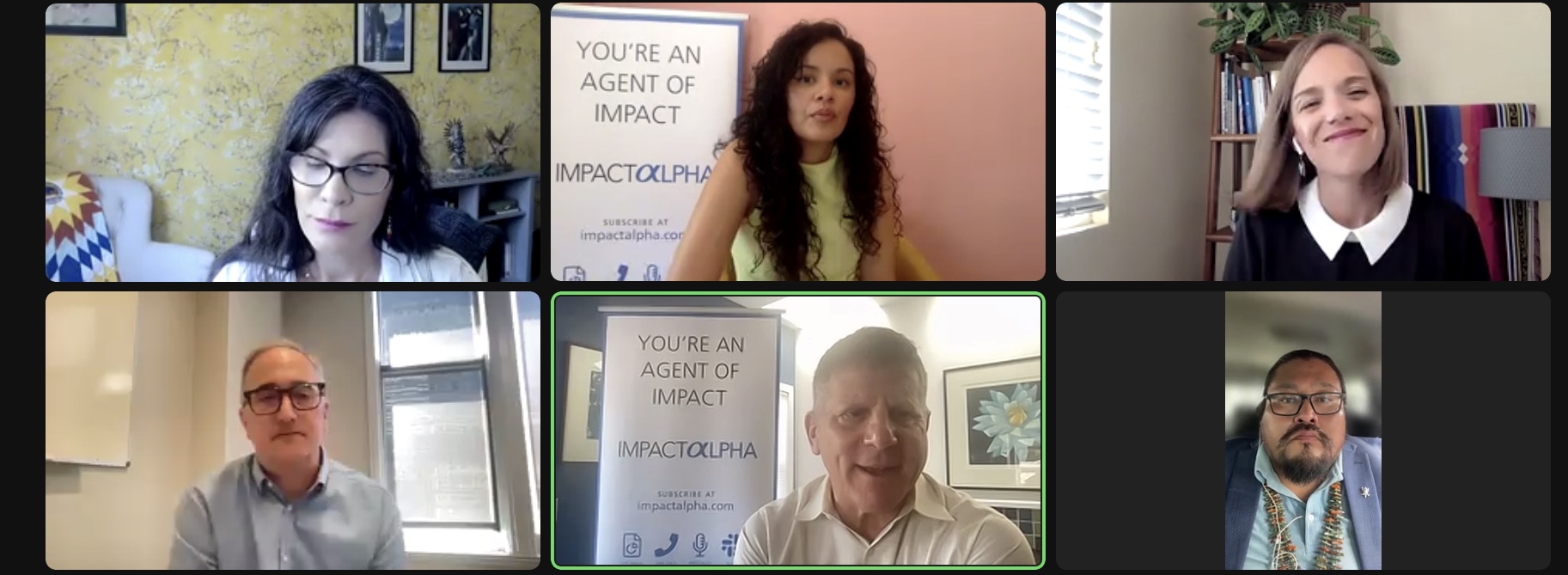ImpactAlpha, June 3 – Just as investment in financial inclusion in Africa was really ramping up, a market downturn threatens to slow progress. Or does it?
Agents of Impact on this week’s Call acknowledged that investors’ diligence and purse strings are tightening, but doubt that fintech startup founders in Africa will be as badly affected as founders in other parts of the world.
“A lot of the investments that have gone into this space in the last few years have actually done very well, and that’s because there’s so much opportunity here. People are getting what they pay for,” said Olu Oyinsan of early-stage tech investor Oui Capital in Nigeria. “Contrary to what a lot of people think. I don’t think the downturn in the global markets is going to have such a profound impact on Africa.”
African startups have raised nearly $7 billion in the past 18 months. More than half went to startups enabling access to financial services for consumers and businesses on the continent. Nearly $1 billion went to just four companies.
Yes, fintech in Africa is right now flush with capital, says Wim van der Beek of Goodwell Investments. “It’s also good to realize that we’ve come from a very low starting point. It’s still one of the most immature ecosystems around the globe.”
Indeed, African startups raised just over 1% of all venture capital invested worldwide in 2021.
The money that continues to flow into the market will affect fintech ventures differently, depending on whom they’re serving and what products they’re offering.
“Unsecured consumer credit is a challenging model in times like this,” observed Amee Parbhoo of Accion Venture Lab. Startups supporting access to finance for productive uses, on the other hand, may prove more resilient.
“The more resilient that companies can make their users, the more loyal those users will be. That’ll drive strong business fundamentals and more resilient companies over time,” said Scott Onder of Mercy Corps Ventures.
Mercy Corps Ventures portfolio company, Pivo, is trying to strengthen and grow Africa’s logistics businesses by providing credit, cash flow management, insurance and other services. Its first product is supply-chain financing for freight carriers that is underwritten based on contracts with corporations and large manufacturing companies.
There has always been a dearth of this kind of financing on the continent, said Pivo founder Nkiru Amadi-Emina, but it’s especially critical in a looming downturn.
“Larger manufacturing brands are doing their best to stretch out payment terms so that they have enough working capital. As you can imagine, that has a trickle down effect on a lot of the small business vendors that are serving them,” she said.
Mercy Corps Ventures and Accion Venture Lab are both zeroing in on companies that are layering financial services into the other types of services they’re providing to small businesses. Accion Venture Lab portfolio company Field Intelligence provides inventory forecasting as well as financing to mom and pop pharmacies in Africa. Mercy Corps Venture portfolio company Wasoko is digitalizing informal retailers and providing them with small lines of credit to stock their shelves.
“Embedded finance is transforming how all of us in this space are seeing financial services reach the customers that we care about,” said Parbhoo.
Business fundamentals
The dynamics of fundraising in Africa are already changing, participants on the call observed. “A lot of companies seem to be doing well, just because there’s the availability of liquidity and follow-on rounds,” said Oyinsan. He expects to see a closer link between “fundraising and fundamentals.”
Parbhoo believes where capital will become most constricted is at the later stages, where most funders are based overseas and only recently began investing in Africa. “We’re already starting to hear a little bit of hesitation from them saying, ‘Look, we’re going to stick to what we know.’”
A few recent examples of corporate governance issues at well-funded companies, like Nigeria’s Flutterwave, is leading investors to raise their due diligence bars. In particular, investors are scrutinizing companies’ pathways to profitability, rather than emphasizing “growth at all costs,” said Oyinsan.
But, he adds, “we have a lot of undervalued companies. We haven’t seen companies where investors are just throwing money at them blindly. But this downturn is a wake up call that if we were starting to get comfortable, we need to tighten our belts again.”
For Nelly Chatue-Diop, founder of Cameroonian crypto-trading platform Ejara, there’s an upside to a more challenging fundraising environment for fintech ventures that are focused on responsible financial inclusion.
“We’ve seen discussions about revenues matter a little bit more than just ‘vanity metrics.’ Six months ago, this is not the kind of discussion you would have with investors,” she said. “And to be honest, we really welcome this kind of conversation because this is how you build a successful business in Africa.”
Ejara offers blockchain-based “noncustodial wallets” that allows users to trade cryptocurrencies and other tokenized assets, and it allows customers to make very low-cost money transfers and payments across borders. The company operates in an environment where there is a high degree of distrust of traditional financial institutions, from central banks to microfinance lenders. Although crypto-trading is new and murky for most users, Chatue-Diop says Ejara’s focus on customer education and community outreach has helped the company garner trust among its growing base of users. But growth takes time.
“I’m surrounded by business men and women in my country that have built a sustainable business by caring about how you provide value for customers,” says Chatue-Diop. “They’re loyal to your brand, to your product, because it answered their needs.”
Gender alpha
One concern of a downturn is whether it becomes harder for women-led startups like Pivo and Ejara to raise capital.
“Last year, only 11 women in Africa managed to raise more than $1 million,” said Chatue-Diop. “Jumping into this new macroeconomic market, what is going to be like if this was the ‘bull market’ for us, women founders?”
Oyinsan says fund managers need to do more to deconstruct inherent biases in their investment decision-making.
“Most investors don’t back people based on gender. That’s not a sustainable business model. But there’s an inherent bias that has been in the industry for a long time. Men have not done a very good job at creating the gender balance that there needs to be,” he said.
Oui Capital’s portfolio is 38% female-led. It’s aiming for 50% by creating a gender-balanced investment team and “focusing on business fundamentals,” which Oyinsan says naturally steers its investments to more women-led companies. “That focus on fundamentals as has allowed us to reach levels that are above industry average.”











